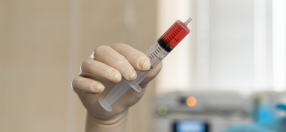Prothrombin time test
Overview:
Prothrombin time (PT) is a test that measures the time taken by blood to clot. It is used to check certain factors in the pathways of clotting or coagulation. It measures the time in seconds taken by the plasma to clot after adding a mixture to the blood. As various reagents can produce different results, an Internationalised normalized ratio (INR) has been introduced to standardize the results.
Prothrombin is the protein produced by the liver and is important for the clotting process. It is one of the clotting factors that initiates the process of clotting when an injury or a cut occurs in the body. Clotting factors are important to prevent severe blood loss and reduce bleeding in injury.
Internationalized normalized ratio (INR):
INR means the ratio of the patient's PT to a controlled PT done with a universal reagent. It is the standardized measurement that was developed by the World Health Organization due to the differences in the lab procedures of the PT.
Indications:
PT/INR measures the proper functioning of the body's clotting mechanisms. This is indicated
- In cases of abnormal blood clots or unusual bleeding
- To check the clotting process in cases of surgeries
- To detect liver issues or vitamin K deficiency and monitor drugs taken to oppose vitamin K like warfarin
- To know the efficiency of the blood thinners and make sure the dosage is correct.
- To diagnose a coagulation disorder called disseminated intravascular coagulation
This test is also indicated when an individual has clinical conditions of bleeding disorders like
- Easy bruising
- bleeding due to unknown reasons
- bleeding from the nose heavily
- bleeding heavily during periods
This test is also indicated when an individual with a clotting disorder has the following symptoms
- Swelling of the leg associated with pain or tenderness
- Redness or darkening of the skin due to easy bruising on the leg
- Unexplained warmth of the skin
- Respiratory symptoms like cough, chest tenderness, and difficulty in breathing
- Heartbeat which is fast and associated with rapid breaths
Before PT:
PT/INRs are done on an empty stomach; hence it is advisable to not eat or drink at least 10-12 hours before the test. It is better to inform the healthcare professional (HCP) of all the medications that are being taken. Avoid over-the-counter medications that increase vitamin K. Certain medications like oral birth control pills, and hormone replacement therapies can alter the results. Hence it should be informed to the HCP. Vitamin K-rich foods like green tea, asparagus, and broccoli can alter the results hence it is advisable not to eat such foods before going to the test.
During the test:
The skin at the site where the blood will be withdrawn is carefully swabbed with alcohol. An elastic band is wrapped around the skin. An individual has to fold the fist to allow the easy flow of blood. Blood will be drawn from a vein by using a small needle. The required amount of blood is collected in a vial and sent to the lab for evaluation. The area is bandaged.
One can also use at-home tests based on the instructions provided by the manufacturer.
After the test:
One can continue daily activities after the test. The result values will depend on the laboratory standards. Abnormal values indicate deficiency or problem with the clotting factors and will be interpreted by a pathologist. Based on the results further investigations will be done to confirm the diagnosis and medications will be prescribed.
Interpretation:
PT results have the following findings. The time taken for the blood to clot is indicated in about 10 to 13 seconds. More time in the PT indicates that the clotting factors are taking more time to clot which can cause severe bleeding. Less time indicates the clotting factors are easily clotting the blood which can cause serious blood clots in the blood vessels.
Prolonged PT indications:
- Liver diseases: Any liver dysfunction leads to a decrease in the production of the coagulation factors that leads to prolonged prothrombin time. This causes the blood to clot slowly. Clinically this leads to the development of symptoms like petechiae and easy bruising.
- Vitamin K deficiency: Vitamin K plays an important role in blood clotting as it is necessary for the synthesis of the clotting factors. Deficiency of vitamin K causes decreased clotting factors that cause a defect in clotting.
- Clotting factors deficiency: Deficiency of the clotting factors can also lead to prolonged PT
- Medications that act against Vitamin K also cause deficiency of the clotting factors that lead to prolonged PT.
Interpretation of INR:
The INR in normal individuals is 1.1 or less whereas the range of INR in individuals taking medications against vitamin K is 2-3. A high INR indicates that blood clots more slowly leading to profuse bleeding. A low INR indicates that blood clots very fast, leading to clotting of blood in blood vessels.
High INR is seen when an individual is taking blood thinners or has liver issues, inadequate protein levels necessary for the blood to clot, and vitamin K deficiency.
Low INR is seen when an individual takes vitamin K-containing blood supplements, intake of foods like broccoli, green tea, turnips, soybeans, and chickpeas, and estrogen-containing pills.
Risks and complications:
There are no risks associated with the PT test. The main risk associated with these is soreness of the arm and bruising at the site of needle insertion which subsides after some time.
Conclusion:
Prothrombin time is the test done to monitor the coagulation status of an individual. It is one of the vital tests done to check the ability of the blood to clot in individuals taking blood thinners and vitamin K drugs. This test should be done regularly in individuals with bleeding and clotting disorders to check the clotting status.
Popular Searches :
Hospitals: Cancer Hospital in Delhi | Best Heart Hospital in Delhi | Hospital in Amritsar | Hospital in Ludhiana | Hospitals in Mohali | Hospital in Faridabad | Hospitals in Gurgaon | Best Hospital in Jaipur | Hospitals in Greater Noida | Hospitals in Noida | Best Kidney Hospital in Kolkata | Best Hospital in Kolkata | Hospitals in Rajajinagar Bangalore | Hospitals in Richmond Road Bangalore | Hospitals in Nagarbhavi Bangalore | Hospital in Kalyan West | Hospitals in Mulund | Best Hospital in India | | Cardiology Hospital in India | Best Cancer Hospital in India | Best Cardiology Hospital in India | Best Oncology Hospital In India | Best Cancer Hospital in Delhi | Best Liver Transplant Hospital in India
Doctors: Dr. Rana Patir | Dr. Rajesh Benny | Dr. Rahul Bhargava | Dr. Jayant Arora | Dr. Anoop Misra | Dr. Manu Tiwari | Dr. Praveer Agarwal | Dr. Arup Ratan Dutta | Dr. Meenakshi Ahuja | Dr. Anoop Jhurani | Dr. Shivaji Basu | Dr. Subhash Jangid | Dr. Atul Mathur | Dr. Gurinder Bedi | Dr. Monika Wadhawan | Dr. Debasis Datta | Dr. Shrinivas Narayan | Dr. Praveen Gupta | Dr. Nitin Jha | Dr. Raghu Nagaraj | Dr. Ashok Seth | Dr. Sandeep Vaishya | Dr. Atul Mishra | Dr. Z S Meharwal | Dr. Ajay Bhalla | Dr. Atul Kumar Mittal | Dr. Arvind Kumar Khurana | Dr. Narayan Hulse | Dr. Samir Parikh | Dr. Amit Javed | Dr. Narayan Banerjee | Dr. Bimlesh Dhar Pandey | Dr. Arghya Chattopadhyay | Dr. G.R. Vijay Kumar | Dr Ashok Gupta | Dr. Gourdas Choudhuri | Dr. Sushrut Singh | Dr. N.C. Krishnamani | Dr. Atampreet Singh | Dr. Vivek Jawali | Dr. Sanjeev Gulati | Dr. Amite Pankaj Aggarwal | Dr. Ajay Kaul | Dr. Sunita Varma | Dr. Manoj Kumar Goel | Dr. R Muralidharan | Dr. Sushmita Roychowdhury | Dr. T.S. MAHANT | Dr. UDIPTA RAY | Dr. Aparna Jaswal | Dr. Ravul Jindal | Dr. Savyasachi Saxena | Dr. Ajay Kumar Kriplani | Dr. Nitesh Rohatgi | Dr. Anupam Jindal
Specialties: Heart Lung Transplant | Orthopedic | Cardiology Interventional | Obstetrics & Gynaecology | Onco Radiation | Neurosurgery | Interventional Cardiology | Gastroenterologist in Jaipur | Neuro Physician | Gynecologist in Kolkata | Best Neurologist in India | Liver Transfer | Best Cardiologist in Delhi




















